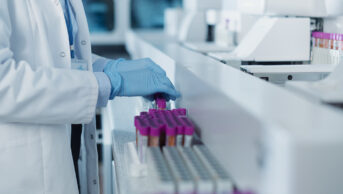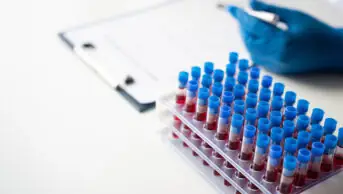
Shutterstock.com
Pharmacogenomic testing could help clinicians avoid prescribing medicines with drug–gene interactions in people with major depressive disorder (MDD), results from a randomised clinical trial in the Journal of the American Medical Association show.
However, the researchers — based at the US Department of Veterans Affairs — concluded that pharmacogenomic testing had small and non-persistent effects on symptom remission.
The trial involved 1,944 patients with MDD who were either initiating or switching treatment with an antidepressant.
The participants were randomly assigned in a 1:1 ratio to receive care that was guided by a pharmacogenomic test for drug interactions, or usual care. All participants underwent genetic testing, via a cheek swab, but only the pharmacogenomic test group’s medication was guided by the results.
The researchers found that the pharmacogenomic-guided group were more likely to receive an antidepressant with no potential drug–gene interaction, while the usual care group was more likely to receive a drug with mild potential drug–gene interaction (no drug–gene interaction vs. moderate/substantial interaction: odds ratio [OR], 4.32 [95% confidence interval (CI), 3.47 to 5.39]; P<0.001 and no/moderate vs. substantial interaction: OR, 2.08 [95% CI, 1.52 to 2.84]; P=0.005).
The estimated risks of no interaction, moderate interaction and substantial interaction for the pharmacogenomic-guided group were 59.3%, 30.0% and 10.7% compared with 25.7%, 54.6% and 19.7% for the usual care group, respectively.
Remission rates over 24 weeks were higher among patients whose care was guided by pharmacogenomic testing than those in usual care, peaking at 12 weeks (OR, 1.28 [95%CI, 1.05 to 1.57]; P=0.02; risk difference, 2.8% [95% CI, 0.6–5.1%]). However, they were not significantly higher at week 24, when 130 patients in the pharmacogenomic-guided group and 126 patients in the usual care group were in remission (estimated risk difference 1.5% [95% CI,−2.4–5.3%]; P=0.45).
David Oslin, director of Veterans Affairs VISN 4 Mental Illness, Research, Education, and Clinical Center and lead author of the study, said: “The results were not a slam dunk. In fact, an important outcome of the study is that only about 15% to 20% of the patients had genes that would significantly interfere with the prescribed medication.
“But I think the results favouring a positive effect on treatment, although small, will encourage providers to test patients and get this genetic information. Future research should explore if there are subgroups of patients who would benefit more from testing.”
Commenting on the study, Ciara Ni Dhubhlaing, chief pharmacist at St. Patrick’s University Hospital, Dublin, and immediate past president of the College of Mental Health Pharmacy, said that treatment choices for patients with MDD are currently made using evidence-based guidelines and pharmacist and/or prescriber knowledge along with patient experience.
“For some, the route to an effective medication may require several trials so the potential to shorten that timeline is welcome,” she added.
“However, the authors note that only around 20% of people have a significant known antidepressant–gene interaction, and there is not yet a way to know who that 20% are.
“Screening all patients before commencing medication could be costly and delay what is likely to be an effective treatment pathway for many.”
Dhubhlaing added that this technology may be best utilised when several medicines have failed and an explanation for that failure may be forthcoming in the patient’s genetic make-up.
Adam Jameson, a mental health pharmacist and researcher at the Bradford District Care NHS Foundation Trust described the findings as “important” because they add to the existing body of evidence, this time in a larger scale trial.
“It provides further rationale for clinicians to offer pharmacogenetic testing, as it shows that treatment response is improved in pharmacogenomic-guided prescribing and may even provide a quicker response rate,” he said.
“I don’t think this study alone will cause psychiatrists to start offering pharmacogenetic testing overnight. More research is needed before pharmacogenetic testing becomes a routine part of practice.
“One thing the study did not assess is the impact of utilising pharmacogenetic results on adverse drug reactions (ADRs) and adherence.
“If further studies can demonstrate an improvement in ADRs and adherence following pharmacogenomic-guided antidepressant prescribing, then I think, along with the evidence for improved symptom remission from this study and similar studies, the rationale for using pharmacogenetic testing would be stronger.”


